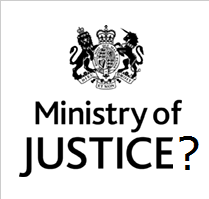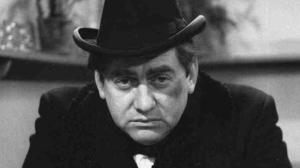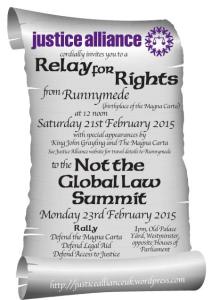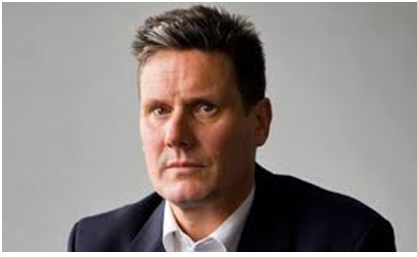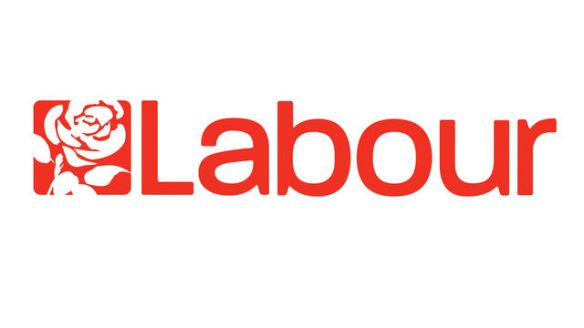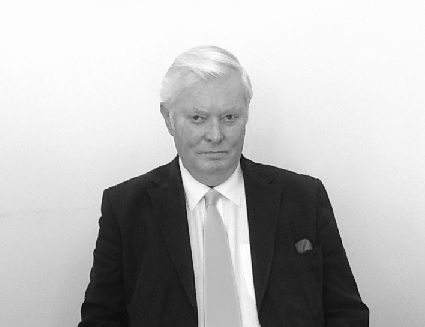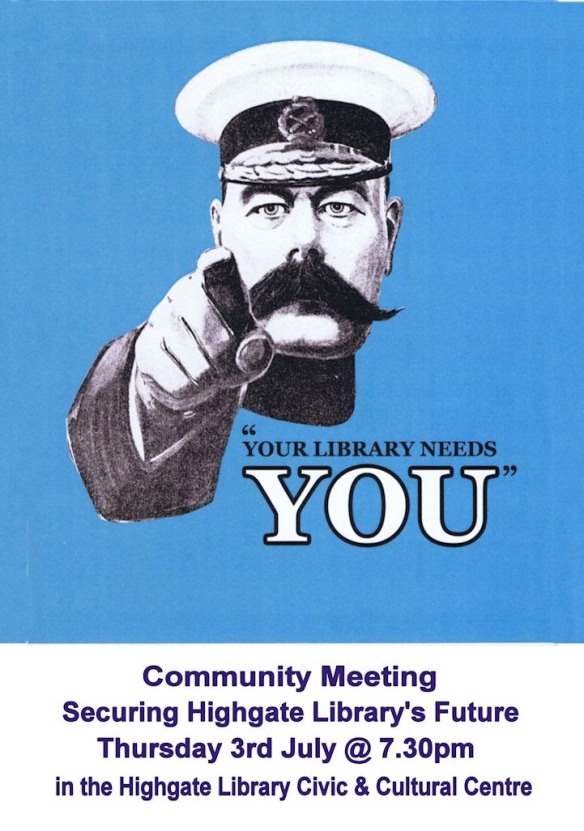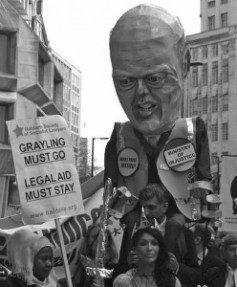This is an absolute must for anyone’s Christmas list.
Author Archives: Oliver Lewis
Andy Burnham and Hillsborough
There are plenty of reasons to admire Andy Burnham. What he did for the people of Liverpool on Hillsborough is one of them.
The State of Criminal Defence – Why Gove Shoots First and Asks Questions Later
The bottom line is that in the end we will have substandard justice system where those accused of offences will have defence teams lacking the proper resources to do the job. The vulnerable, the young and the mentally ill will be even more compromised when caught up in this system.
Read more from Paul Harris on the precarious state of Criminal Legal Aid.
If you are a solicitor or barrister vote for action here.
Does Magna Carta mean nothing to you?
As lawyers and business leaders attended the controversial Global Law Summit, marking the not quite 800th anniversary of Magna Carta, the Justice Alliance held its own alternative events, with a Relay for Rights starting at Runnymede culminating in a protest outside Parliament.
When Lord Chancellor, Chris Grayling, finished licking the envelopes containing invitations to speak at the Global Law Summit we can feel reasonably certain that there were none addressed to legal aid solicitors. Plenty of invitations were set aside, though, for large city firms, posh chambers, corporations and financial institutions. Jonathan Black, President of the LCCSA wasn’t too surprised that his postie never delivered an invitation to the £1750 per ticket event. “This was nothing less than a business fair, with Grayling using and exploiting the anniversary of Magna Carta to sell UK legal services. Even Dominic Grieve called the event a ‘legal Davos’. That’s why the naughty children like us weren’t invited,” he says.
Black is highly critical of Grayling and the Prime Minister. “It’s all extremely rich of Grayling given his attack on legal aid, the probation service, prisons, and the contempt he’s shown for justice system.” Meanwhile David Cameron, who penned the foreword to the Summit’s glossy brochure, hosted the world’s justice ministers at Downing Street, while pretending the disaster in the justice system on his own doorstep wasn’t happening, Black says.
Justice Alliance campaigner Matt Foot of Birnberg Peirce has also been flicking through the brochure. “Nowhere in their literature or brochure do they mention what Magna Carta actually says: ‘To no one will we sell, to no one deny or delay right or justice.’ I think there’s a good reason for that: the summit had nothing to do with Magna Carta and everything to do with promoting free enterprise and big business.” He points out the double standards where the government has been busy cutting access to justice. “You can’t get a lawyer for employment tribunal cases now, the work in family and housing has been halved, access to courts has been taken away and the quality of criminal defence is going to be decimated under the proposed dual contract and cuts. It is just rank hypocrisy calling this event anything to do with Magna Carta.”
Foot is sceptical about the guest list too. “I see no connection between say Vodafone or BAE Systems and Magna Carta and access to justice. BAE deals armaments around the world, I really don’t understand why they were invited to a celebration of Magna Carta,” he says. Other invitations and attendees at the event also proved contentious. Liberty director Shami Chakrabarti pulled out, saying “My place is with the protestors.” Late invite shadow justice secretary Sadiq Khan declined his invitation, “A better way to celebrate Magna Carta’s birthday is defending the rule of law,” he said. Key note speaker Lord Green, late of HSBC, withdrew late in the day for different reasons.
Chair of the CBA, Tony Cross QC, spoke at the event. Many are critical of his decision to attend. “By going there, we are tacitly endorsing what Grayling is doing to the criminal justice system,” said John Cooper QC. Cross disagreed and insisted on delivering his message from the platform. “Turn back from your intended course,” he told the government. Otherwise “you not only risk denying access to justice but also risk turning the Magna Carta into a parchment worthy only of note to historians, instead of the foundation of our freedoms of which we are so proud.”
The summit was beset with other problems. Some have raised eyebrows at the timing of the event, noting that the actual 800 anniversary of Magna Carta falls a few weeks after the general election in May. “The government is rewriting historical dates to make political capital out of a celebration of the rule of law,” says Sarah Forshaw QC.
Others have been critical of the event too. Peter Oborne, newly departed Telegraph writer, eviscerated the government for holding the summit while simultaneously considering a withdrawal from the European Convention on Human Rights and undermining the rule of law. “Mr Cameron’s government has launched a systematic attack on the legal aid system which gives poor people access to the justice system. There has always been a two-tier system of justice in Britain, one for the poor and one for those who can afford expensive private lawyers. The government changes have widened this divide, and run flatly contrary to Magna Carta,” writes Oborne.
Former DPP turned prospective parliamentary candidate Keir Starmer agrees. “The best way to celebrate Magna Carta is to defend and protect human rights in the 21st Century. For a government hell bent on repealing the Human Rights Act, supporting this Global Law Summit was an act of supreme irony.”
Rhona Friedman, Bindmans solicitor and co-founder of The Justice Alliance, explains how the Not The Global Law Summit came about. “We wanted to point out the hypocrisy of the Ministry of Justice co-hosting a global law summit when they are curtailing the right to hold the state to account for unlawful decision making.” Friedman, who helped to coordinate the Not The Global Law Summit, is passionate about the importance of defending the principles set out in Magna Carta, particularly for the vulnerable who are now being denied legal aid and access to justice and is contemptuous of Grayling’s summit, describing it as “a backslapping corporate jamboree with very little to do with the values of Magna Carta or the rule of law.”
The Relay For Rights began two days before the Global Law Summit with an event at Runnymede, where Magna Carta was signed, before supporters set off for London along the Thames path. Early next morning they were off again, as far as Putney, and on the Monday resumed from St Mary’s Church, scene of the historically significant Putney debates, arriving at Westminster for a rally at which Silks actress Maxine Peake read from Magna Carta itself.
For Jonathan Black, the rally sent an important message to the people at the summit. “The bottom line is we get cuts from the Lord Chancellor while the commercial law sector were given a party which we, the naughty children, weren’t invited to and were told to mind our manners and be quiet,” he says. “Well, we weren’t quiet: we came downstairs and made a lot of noise!”
This article appears in the March 2015 edition of The London Advocate
Not the Global Law Summit
At the not quite 800th anniversary of Magna Carta, neatly timed to coincide with this government’s dismantling of access to justice and the rule of law, the Lord Chancellor is celebrating with a Global Law Summit featuring speakers from BAE and Goldman Sachs? Confused? Go to the the Justice Alliance alternative instead on 23 February.
Read Peter Oborne on the Global Law Summit here.
Read about the MOJ nasty deal with the Saudis here.
.
Keir Starmer talk: “Free speech, surveillance and human rights: uniting London in response to the Charlie Hebdo atrocities”
Bill Bache interview: Angela Cannings, Experts and Legal Aid
We can afford justice!
Solicitor Bill Bache is best known for representing Angela Cannings, the mother wrongfully convicted of murdering three of her children. Here he speaks to Oliver Lewis about the case, expert evidence, legal aid cuts, and his long career which has taken some unusual turns. This article appears in the latest edition of The Advocate
Bill Bache is one of the few lawyers to have done both conveyancing and to have appeared in a Court Martial in the middle of a warzone. And that’s before you get to the family courts, war crimes cases, ID parades in Basra, the coroner’s court where he sat as a deputy coroner, and of course his practice as a leading lawyer in ‘cot death’ and ‘baby shaking’ cases in the criminal courts.
Traditional solicitor
We meet in a bar on Theobolds Road a few hundred yards from his London office. Every inch the old school solicitor in smart linen jacket, striped shirt and pink tie on a sunny afternoon, he sits alongside his long-time colleague, Jacqui Cameron.
Bill served articles with a firm in Bedford Row before qualifying in 1967. He then worked in local government before joining a firm in Salisbury in 1973 where he first did conveyancing and civil law. Soon he was appearing in magistrates and family courts regularly, as well as in courts martial, Salisbury being near to an Army base.
“I was prevailed upon to go courts for which I hadn’t been particularly trained but they seemed to like what I did,” he says. “As time went on I found what I seemed to like was looking out for the individual against the power of the state in one way or another.”
A spell as deputy coroner for Swindon and Wiltshire sparked an interest in medical aspects of legal proceedings and later he became involved in the case that would become one of the most difficult of his career.
Angela Cannings case
When he was asked to represent Angela Cannings it seemed providential, he says. His experience in the criminal courts, the coroner’s court, and in dealing with care proceedings all came together, but even with all that useful experience under his belt, the difficulties in the Cannings case came as a surprise, not least, he says, the prejudice and difficulties faced by women brought into a dock to defend themselves against charges of killing their baby.
The Cannings case came not long after the similar case of Sally Clark, who like Angela Cannings had been brought up in Salisbury. That case had also featured evidence from the paediatrician Professor Sir Roy Meadow. A family solicitor friend of sally Clark warned Bache about what to expect, and told him to forget any illusions about the prosecution having to prove their case. What you effectively have to do, he was told, is go out and prove your client’s innocence. With three deceased children that was going to be difficult.
“I was almost naive at the time,” says Bache. “I had always proceeded on the basis that it was the prosecution’s job to prove its case and to do so beyond reasonable doubt, and if it couldn’t do that then in my book the accused should walk free. I kept being told there had been three cot-deaths and therefore it was likely to be murder. I never followed the logic at all.”
Eventually he got hold of the prosecution papers. “I have been dealing with criminal matters for a long time and in nearly all those cases your client can’t understand why they have been arrested, some of them protesting more sincerely than others about their innocence I should say, and you turn the pages and there nearly always comes a moment when you see something in the evidence when you say ‘Ah, that’s why they think you have committed an offence, I can see the police’s point, I can see why they are saying there should be a prosecution. In the Cannings case I turned the pages from beginning to end and I never found anything of the kind.”
Expert witnesses
Bache set about the case determined to find the right experts, but at first found it difficult to find anyone prepared to help.
“Most experts you wouldn’t see for dust. Finally we found someone prepared to be sceptical about the dogmatic claims that it had to be murder. Then we began seeing experts who said we also needed to go to this or that specialist, each sparked off the need to go to the next. We spoke to over twenty experts and ended up calling sixteen at the trial.”
Cot-deaths were then and still are to an extent a scientific enigma, he says. “There were all sorts of theories, and some were better than others. It was a very good grounding in how to deal with cases of this nature and a lesson in looking at the whole picture. The family had lived in a small village where there had been a cluster of cot-deaths and so we investigated whether there might there have been an environmental factor. There was also a nearby Government research establishment where experiments relating to biological and chemical warfare were taking place. We had to look at everything.”
Cannings was convicted by the jury, partly on the evidence of the later discredited Meadow, but Bache never doubted his client’s innocence.
“With Cannings, and indeed all the mothers and fathers I have had to deal with in this situation, there is something about them which makes you think there is absolutely no way they have done what they are accused of. Their innocence shines through in a way that simply doesn’t happen in most other cases. I am struck by their sheer bewilderment that anyone could even think they could have hurt their child.”
Appeal
After Cannings was convicted, Bache knew they had to appeal. He was helped by a BBC journalist who researched the Cannings records in Ireland and discovered cot deaths in the family. Then the night before a pre-trial hearing and just a month before the appeal itself Bache received a phone call. Until that moment Angela Cannings didn’t know she had a half-sister.
“I had been working late hours on the appeal and for once I had more or less tidied my desk and I was in two minds whether to answer it. She told me that her own children had all had episodes or attacks where they had difficulty breathing. We were seeing her within the hour. We had to get new reports from a geneticist and others and be ready for the full hearing in a month. The Court of Appeal came to the conclusion that there may well have been some natural cases at work.”
The judgment was a landmark. “Although we were gutted when she was convicted, in hindsight we would not have had the benefit of the brilliant judgment by Lord Justice Judge, which seemed to me to redress the balance and bring things back to where they should have been in the first place, which was to remind everyone that the prosecution does need to prove its case. And if there is no scientific explanation you cannot simply go on from there to say there must have been criminal behaviour. If there is no scientific explanation then the answer is ‘We don’t know’. That should result in an acquittal.”
Similar cases
Since Cannings, Bache has dealt with a series of cases in which the interpretation of complicated medical data has been key. He secured an acquittal at a retrial for the couple accused of murdering their child in the salt poisoning trial.
“These sorts of cases seem to come in and out of fashion. The allegations against Clark and Cannings were to do with smothering. Then we had a spell of salt poisoning cases. Now there is an increasing number of shaken baby cases.” The consequences of these cases, he says, can be utterly devastating. “In the event a parent is found guilty of causing death or injury they will never be allowed to keep any future children. The children will be taken into care straight away. It’s been known for police to be actually in the delivery room waiting to take the new-born child. The consequences last forever, and if this is done as a result of an injustice that is a terrible price we pay as a society.”
So how does Bache assess the importance of the availability of expert evidence?
“The best way for defendants or parents to demonstrate they are not guilty is to have the evidence extensively examined by the right experts of weight and reputation. The prosecution and local authorities return to some experts time and again because they anticipate the opinion is going to fall down on the side of abuse. Where there is a grey area the most valuable experts are those who take a long and independent look at the data and give a carefully thought out and reasoned opinion. You should trust your experts, but make sure they are not dogmatic. I have heard experts talk about ‘mainstream opinion’, implying that it must be right. I won’t have truck with that. You only have to look at the time when people thought the earth was flat or the sun went round the earth, dearly held dogma to the point where anyone who said otherwise was executed.”
There are too many experts with an investment in having their pet theories proved, he says.
“There’s a danger they may be tempted to interpret the evidence in ways which support their dogma rather than giving an independent view of the evidence. Defendants can only break down that wall with the help of courageous and skilfully applied science with experts of the right calibre.”
Legal aid cuts
How does he see the current round of legal aid cuts affecting how justice is done?
“All solicitors know that getting funding for experts is a difficult process. You must get prior authority, which is often not approved because the rates are too high, yet these are world leaders in their fields. So someone perhaps facing a life sentence may be denied the best help they can get, facing a charge brought against them by the state, yet the state is not prepared to fund them. I notice the prosecution rarely have difficulty in instructing their own experts, yet defendants are squeezed and face great difficulties imposed by the state which makes it harder freely and properly to prepare their cases. And it is far worse now than when we did Cannings. It would be very difficult now to get the number of experts we did in the Cannings case.”
He would like to see changes to the way funding of legal aid is administered. “Prosecutions are in state hands, which is as it should be, the courts are run by the state, and the funding to allow people to defend themselves is also in state hands. I would like to see a reversion to the separation of powers, I would like to see funding placed in more independent hands as it used to be.”
What about people who say we can’t afford it?
“Yes we can! What we can’t afford is a shabby system of justice which doesn’t care and allows serious injustice to go on, because that is deeply corrosive to the welfare of the population as a whole and it is not the hallmark of what a great country should be! I can see the whole thing deteriorating. The situation over the remuneration of excellent, experienced and courageous advocates and solicitors is deplorable, it’s a disgrace and it does shame to this country that it has been brought to this.”
War zones
Equally at home in the criminal court and the family court, country and town, he’s been in a few battles on home soil, so how come he ended up in that warzone?
“We were doing an Army case and we had to go to Bosnia and we did the first Court Martial to take place in a theatre of war since the end of WW2. That was the first time I’d gone to court issued with helmet and flak jacket,” he says. “I didn’t think my advocacy was that bad actually!”
He didn’t miss conveyancing then? He laughs: “I’d given up conveyancing by then, far too dangerous!”
Securing Highgate Library’s future
“Council election 2014: Campaigning lawyer standing in Highgate for Labour”
Grayling Day
This article appears this month in the LCCSA magazine The Advocate
The courts are empty of lawyers. At Westminster, Old Palace Yard is overflowing with them. Barristers and solicitors are spilling out into the road. Bemused tourists stop and take pictures of the English men and women, some in wigs and gowns, shouting on a grey Friday morning in March. This is where the action is.
There is poetry. There is jazz. Oh, and there is a massive effigy of Chris Grayling. Indeed, the day is dominated, literally and figuratively, by the odd, unsettling presence of the Lord Chancellor.
On indictment
Greg Foxsmith begins proceedings with an indictment of Grayling for conspiracy to destroy the criminal justice system. The huge pink face of the defendant remains impassive. The witnesses for the prosecution are many.
Paul Harris is passionate: “The justice system is in meltdown! This is about unfettered access to justice. The government is reducing the accountability of the state and increasing power over the individual.” Criticising restrictions on judicial review to challenge unlawful state action, he tears into Grayling for refusing to talk to the National Justice Committee. “We won’t stand by and watch you destroy the criminal justice system,” he tells the defendant. “The Ministry of Justice is not fit for purpose! Justice on the cheap is not justice!” The crowd loudly approves.
From over the road in the Houses of Parliament, Black Rod asks for the lawyer gang not to make quite so much noise. Black Rod is given some free legal advice. The lawyer gang make more noise. Chris Grayling’s great claw sways in the breeze, insouciantly dismissing the “Grayling Must Go” banners. Maxine Peake is posing for photos in the crowd. “I’m here because I’m filled with dread and fear of what this government is doing to the weak and the dispossessed in this country,” says the actress from the TV drama, Silk.
Chair of the Criminal Bar Association, Nigel Lithman QC, is up. “It takes centuries and much sacrifice for democracies and justice systems to emerge,” he says. “It’s taking this government the blink of an eye to demolish it. We will be left with one law for the rich and one for the poor! The MoJ is inept!” The evidence is stacking up.
Speech after speech
Shadow Lord Chancellor, Sadiq Khan, takes to the stage. He says Grayling is a woeful mix of blind ambition and wilful ignorance and is the most legally illiterate Lord Chancellor in history. “Chris Grayling believes that the Magna Carta is a bottle of champagne,” he says. “I am with you!” he cries. “We will defeat them!”
Even the Tories are piling in now. Ivan Lawrence QC, 23 years a Conservative MP, says he is ashamed of this government. “I’ve been at the Bar for 50 years and I have never seen a demonstration like this. We will make this government frightened of our resolve. We must make them know if they don’t stop savage cuts they will not be re-elected.” More cheers.
Veteran solicitor Alured Darlington is in the crowd and agrees there’s been nothing like this before in his 51 years of practice. The crowd is getting bigger.
Banners and signs appear. “Keep Calm And Call The Duty Solicitor” says one.
The mother of Gary McKinnon, Janis Sharp, is on the stage. “One day, it could be you needing a lawyer,” she says. “You’ve no idea the relief when a lawyer says they will take your case without asking how much money have you got.”
Now it’s Liberty’s Shami Chakrabarti. “This is Grayling’s day of shame,” she says. “The government are constitutional vandals!” CLSA chair Bill Waddington is scathing too. “It took 800 years to build this system,” he tells Grayling. “Leave it alone!” The swollen head of Chris Grayling looks on, his preternatural smirk undisturbed by the strength of the case against him.
Birmingham Six defendant Paddy Hill is on the attack. “It wasn’t us who caused the financial crisis, it was them and their banker mates,” he yells pointing at Parliament behind him. Now it’s Dave Rowntree. “The government is creating a separate McJustice system for the poor,” he says. Ian Lawrence of NAPO says there must be no privatisation of the probation service. Grayling’s got form he says. “He’s a repeat offender!” he blurts out.
The closing speech is delivered by solicitor Matt Foot, son of journalist Paul Foot and great-grandson of Liberal minister and campaigner for legal rights Isaac Foot. “This is an ideological attack,” he says. “Grayling is picking on the most vulnerable.” He calls for more action. The crowd agree. It’s poetry time. “Rise like lions after slumber!” he exhorts.
On the march
Stirred by Shelley, the crowd are on the move, ready to take the fight to the Ministry of Justice. The defendant is secured and heads the march like a terrifying Pied Piper alongside the golden Lady Justice. The jazz band is up and playing, and with their hypnotic accompaniment, we’re off towards Petty France, the Justice Alliance banner leading the way. We stop off at the Liberal Democrat headquarters to drop off a love letter to Simon Hughes, the justice minister. “Simon Hughes, shame on you!” we yell happily.
The march snakes back along the length of Storey Street, lawyers as far as the eye can see. The throng eventually masses outside the Ministry of Justice. An official is popping out for lunch. “Ooh look! It’s a giant Chris Grayling,” she says to her friend. “Quite flattering actually,” she adds.
There is excitement. What will happen next? (The possible criminal liability of a peaceful occupation of the Ministry of Justice goes through a thousand legal brains simultaneously like an old exam question. “Explain what criminal offences have been committed, if any, making reference to mens rea and actus reus.”)
We settle for some old-fashioned well-mannered chanting. “Legal Aid must stay, Grayling must go!” A cry goes up: “Bring me the massive head of Chris Grayling!”
Lady Justice accompanies Paddy Hill inside to deliver a letter to the real Chris Grayling, who declines to make an appearance. The press photographers bundle through the double doors. It’s all a squash. The security guards are tolerant until the gigantic effigy of the Lord Chancellor tries to get in too. To the amusement of the MoJ officials, the Lord Chancellor is barred from entering. Outside, the crowd shout “Grayling Grayling Grayling, out out out!” “Let him in! Grayling in!” is the cry from inside. Now the immense pink head of Chris Grayling is jammed in the doorway of the Ministry of Justice, a sight few would wish to relive.
Central Hall
The chants continue. As no-one can think of a way of pithily shouting, “They say cutback, we say we are prepared to sit down with you to outline a series of savings that can be found across the criminal justice system,” the crowd disperses to reassemble in the Methodist Central Hall for the LCCSA training afternoon, where president Nicola Hill is pleased with the day so far. “The turnout today has been fantastic. We will gather momentum and I hope Chris Grayling will now man up and stop these cuts.”
As Jon Black introduces the speakers, the glowering figure of the Lord Chancellor stares defiantly back upon the assembled delegates. Unperturbed, Richard Atkinson sets out the full horror of Grayling’s reform. “We are peering into the abyss,” he says. The future? A black void appears on the screen. Richard Furlong of 25 Bedford Row advocates the withdrawal of solicitor’s goodwill from the court system. Richard Bentwood of Argent Chambers sets out the “no returns” policy.
The lawyers on the panel in the afternoon are united. Greg Powell graphically tells us that solicitors will be “nipple to nipple” with barristers in the fight to come. “Grayling has to understand that, when we say something, we mean it,” says Nigel Lithman. Disappointingly, he wasn’t talking about the nipples thing. Bill Waddington says there will be no cracks in unity, a message echoed by Aika Stephenson of Just For Kids and Raj Chada of Hodge Jones and Allen. In January, the courts were closed for half a day. Today, the courts are closed for a full day. To applause, Raj Chada calls for a three-day action next time, and advises Shadow Justice Minister Andy Slaughter to listen to the people in the hall. “Together we will forge unity,” he says.
As people are leaving, Matt Foot surveys the day’s work and is uplifted. “It’s been a wonderful day, there was nowhere left to stand this morning, and the march to the Ministry of Justice filled up the whole road. Solicitors and barristers are very serious about the fight with Grayling.”
Shelley’s The Mask of Anarchy:
Rise like Lions after slumber
In unvanquishable number
Shake your chains to earth like dew
Which in sleep had fallen on you
Ye are many – they are few.


